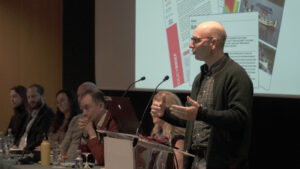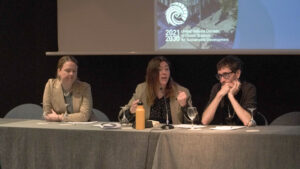MPA4Change at the Ocean Decade Conference 2024, Barcelona.
From April 5th to 12th 2024, the UNESCO Ocean Decade Conference 2024 was hosted in Barcelona as part of the UN Decade of Ocean Science for Sustainable Development (2021- 2030).
Coordinated by UNESCO’s Intergovernmental Oceanographic Commission (IOC/UNESCO), the Ocean Decade seeks to stimulate ocean science and transform this knowledge into action to reverse the decline of the ocean ecosystem and catalyse new opportunities for sustainable development.
This international event provided a convening framework for a wide range of stakeholders across the world to generate data, information and knowledge needed that will contribute to a well- functioning, productive, resilient, sustainable and inspiring ocean.
The Ocean Decade MPA Forum, a satellite event.
Due to the vast number of initiatives that requested a slot in the Conference, which reflects how relevant marine conservation currently is, the Ocean Decade Conference counted with a vast array of satellite events organised in its framework.
Among them, the Ocean Decade MPA Forum – Marine Protected Areas: Progress, Obstacles and Solutions was independently organised by several international organisations – among which the EUROPARC Federation, and provided an opportunity to exchange on the current status of Protected Areas worldwide. Counting with a strong representation from both Latin America and the Mediterranean region, the Forum allowed participants to explore four key themes that are driving the contribution of MPAs to the Ocean Decade goals: Challenges, Best Practices, Solutions, Maintaining Momentum and Scaling Up.
A clear message came out from the presentations: biodiversity conservation goes beyond legal protection; to really achieve it, an effective management of the MPA is urgently needed. However, the sad reality is that the vast majority of MPAs worldwide still lack management plans.
Management plans should be built on two pillars: science and early participation of relevant stakeholders. People need to be part of the process, not just be informed at the very end. The implementation of management plans should entail monitoring and surveillance. Technology brings new opportunities to achieving this. Several presentations focused on the use of electronic and aero-maritime (drones, or remote control mini-boats) monitoring systems for surveillance of both coastal and large remote MPAs.

Joaquim Garrabou speaking, Ocean Decade MPA Forum – Photo by EUROPARC Federation.
International cooperation is also key to achieve biodiversity conservation. When we look at the movement of water particles, we realise how connected everything is; there is permanent movement from one site to another. Likewise, MPAs from a same region, share the same migrant species and face the same issues – the spread of non-indigenous species, pollutants, and heat waves. Cooperation allows for early alert of emergencies, fast track solutions and accelerate legislation changes. It also allows for a stronger voice.
In this sense, a recent alliance created between Colombia, Costa Rica, Panama and Ecuador to boost the Eastern Tropical Pacific Marine Conservation Corridor – CMAR was presented. Equally, the MedPAN network and MedFund, a new environmental trust fund based in Monaco, specifically dedicated to the financing of marine protected areas in the Mediterranean, were introduced.
Climate Change Adaptation and Restoration in Marine Protected areas
Among the initiatives presented for “Keeping the momentum and Scaling Up”, both Joaquim Garrabou from the Marine Science Institute of Barcelona (ICM), as part of the Spanish Research Council (CSIC), and Teresa Pastor from the EUROPARC Federation, had the opportunity to introduce the work underway in order to foster the adaptation of Marine Protected Areas to Climate Change in the Mediterranean region and the rest of Europe.
Joaquim Garrabou focused on explaining the current situation and threats that Marine Protected Areas are facing in the Mediterranean and how climate change effects are equally jeopardizing the marine ecosystem services which the Mediterranean area strongly relies on, as well as the ability of Marine Protected Areas itself to protect the habitats and species they shelter.
100 MPAs adapted to climate change by 2030
Joaquim also highlighted that we are strongly behind schedule to achieve the conservation goals set by the Convention on Biological Diversity and the Biodiversity Strategy, and that we urgently need to improve the effectiveness of MPAs at all levels. In order to move forward and deliver time-bound and specific results, he set as a target to support 100 MPAs to set climate change adaptation strategies in place by 2030 the Mediterranean region.
By 2030, we expect that 100 MPAs in the Mediterranean basin will count with climate change adaptation strategies in place – Joaquim Garrabou, CSIC.
This target will be reached through the implementation of MPA4Change project, which offers a set of toolkits developed in previous Interreg Euro-Med initiatives, addressing different factors underpinning the effectiveness of MPAs in achieving their conservation goals.
The solutions offered by MPA4Change

Teresa Pastor in the panel discussion, Ocean Decade MPA Forum – Photo by EUROPARC Federation.
Furthermore, a more in detail revision of the solutions that MPA4Change project bring to the table was presented by Teresa Pastor, Policy and Project Manager – Sustainable Tourism Manager from the EUROPARC Federation. These solutions focus on areas such as participation, climate change vulnerability assessment and monitoring, citizen science activities, adaptation strategies and communication. They form the key components that experienced MPAs will transfer to other areas willing to improve their capacities to increase their resilience to Climate Change. Additionally, and also as a result of MPA4Change, a group of experts will be created to support MPAs in the process of adaptation to climate change.
In her presentation, Teresa also explained how these toolkits will be integrated, in the form of recommendations, into regional and European policies in order to set alliances with relevant institutions such as SPA/RAC, and regional networks such as MedPan and the Union for the Mediterranean, which were strongly represented during the Forum. Finally, Teresa called to MPA representatives present among the participants to join MPA4Change and incorporate the solutions offered to adapt to climate change.